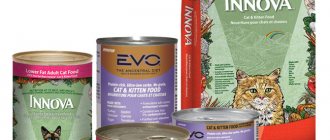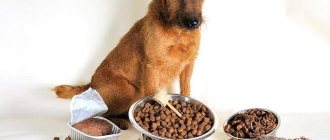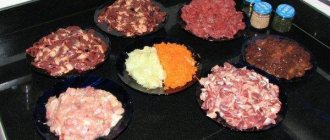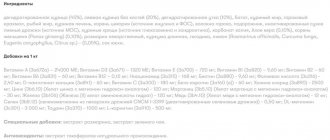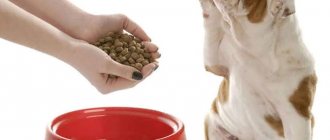One of the main causes of gastritis in pets is their improper feeding. Gastritis in a dog is a disease in which the mucous membrane of the animal’s stomach becomes inflamed. In addition to questions about basic drug treatment, owners are looking for an answer to the most important question: “What to feed a dog with gastritis?” It is an integrated approach to treatment and dietary nutrition that allows you to effectively cope with a disease such as gastritis.
How do medicinal ones differ from regular ones?
Veterinary diets differ in composition from conventional feeds. This may be either an increased amount of special additives or microelements, or the absence of ingredients potentially harmful to the dog’s health.
A distinctive feature of medicinal feeds is that they are consumed for a limited time. Until the pet is completely healthy. You can find out more about the terms of use directly on the product packaging.
When is medicated food prescribed?
Therapeutic diets are prescribed in the following cases:
- with gastritis;
- for food allergies;
- for gastrointestinal diseases;
- for liver disease;
- for kidney disease;
- for dermatoses (irritations of the skin and fur);
- with urolithiasis;
- cardiovascular diseases;
- oskalata, pancreatitis.
The most common reason for prescribing specialized food is an allergy to certain ingredients. The veterinarian determines what the dog is allergic to and prescribes the appropriate diet.
Veterinary diets are often prescribed for older dogs. This is due to the emergence of numerous health problems during the aging process. First of all, this concerns joint diseases.
Forms of gastritis: acute and chronic
Acute gastritis . This is an acute inflammation of the mucous membranes of the stomach, which often develops against the background of other diseases (for example, acute infections). It is accompanied by severe and sharp pain in the stomach, a rapid deterioration in the pet’s condition, and a rapid increase in symptoms (weight loss, increased body temperature, increased bowel movements).
Chronic gastritis . The main feature of this form is its asymptomatic development. It occurs independently or against the background of acute gastritis. Since symptoms are not expressed, inflammation develops over several years. With chronic gastritis, the pet experiences gradual weight loss, frequently changing appetite, and vomiting that is not associated with food intake.
If acute gastritis is not treated effectively, then in 85% of cases it becomes chronic.
What components should be in veterinary food for dogs?
Medical nutrition is so called because it should help the pet overcome some disease. Accordingly, it must contain some useful components.
Problems with the gastrointestinal tract
Food for dogs with digestive problems should include ingredients that improve stomach function. This is facilitated by herbal supplements that stimulate the liver and stomach. For example: flaxseed, beet pulp, eicosapentaenoic and docosahexaenoic acids, Omega 3. Also, to reduce the load on the gastrointestinal tract, the veterinary diet should contain a minimum amount of fat. Among the additives in the food there should be Choline Chloride, because it helps the damaged liver cells to recover. But abnormal protein content, on the contrary, harms the liver.
For obesity
A good dietary dry food should contain a reduced amount of fat and protein. It is important for overweight pets to consume plenty of fiber. It is easily digestible and provides enough energy for the whole day. Healthy carbohydrates such as potatoes, rice or barley (whole grain, not flour or cereal), flax, beets, carrots and other vegetables and fruits should be present.
For cardiovascular diseases
The diet for animals with heart problems must include the following mineral supplements: K, Mg, taurine and L-carotene. At the same time, the content of sodium and Cl in any form is reduced to a minimum (and even better if these components are absent).
Allergy
The hypoallergenic food market is quite large. To find out which ingredient is causing irritation to your four-legged friend, consult your doctor. Remember that the fewer exotic additives in the food, the lower the chance of a negative reaction in your pet. Choose foods with one source of protein. That is, if the food contains duck, the meat and offal should only be duck. This way you minimize possible damage.
Dry medicated dog food
When choosing medicinal food for your pet, the most important thing is to do no harm. It is important to choose products with a high-quality composition and a sufficient amount of fortified supplements.
Causes of pancreatitis
You should understand why a dog needs a pancreas. This is an endocrine gland that “produces” and secretes enzymes that help break down and better break down raw meat.
Initially, a dog was a predator that for many millennia ate raw game, so the process of digesting just such (thermally untreated) meat was improved. Nowadays, domesticated dogs eat dry food, canned food and pates, so the amount of enzymes produced is not completely “used”. And as stated above, these enzymes destroy the pancreas itself, irritate it, leading to its inflammation.
Here are the main reasons for the development of pancreatitis:
- Incorrect diet or sudden change (sudden transition from one type to another).
- Genetic predisposition. Some breeds are prone to pancreatic inflammation. These are boxers, toy terriers, spaniels, miniature poodles, miniature schnauzers, border collies, and Yorkshire terriers.
- Uncontrolled use of drugs. Self-medication is dangerous, since many drugs negatively affect the digestive system. Therefore, you should not prescribe treatment for your pet yourself. Only a veterinarian should decide what medicine your pet needs.
- Infectious diseases. Especially if the causative agent of the disease affects the digestive organs.
What brands produce veterinary food?
Note that not all dry food manufacturers burden themselves with producing a veterinary line. Which manufacturers produce specialized feeds:
- Brit;
- Hills;
- Farmina;
- Monje Grainfree Veterinary;
- Royal Canin Veterinary Diet;
- Purina Veterinary Diets.
To find out whether a certain company produces medicinal food, just familiarize yourself with their assortment. For example, you can find hypoallergenic food from such popular manufacturers as Acana or First Choice.
We have prepared a small rating-review of medicinal foods.
Brit VD Struvite Dog for kidney stones
Brit is a completely grain-free complete food for dogs. The composition of the granules is designed to help animals suffering from struvite stones. Other ingredients include: cranberry, methionine, probiotics for gut health.
Farmina Vet Life Gastrointestinal for gastrointestinal diseases
Veterinarians prescribe farmina to pets who have recently undergone gastrointestinal surgery. The composition contains an increased amount of probiotics. It is also recommended for pancreatitis and other diseases of the pancreas.
Hills Prescription Diet for allergies
Dry therapeutic food Hills for dogs with allergies. The composition is selected in such a way as to exclude most possible allergens. Although there is also little good in Hills food. Corn is present, the composition is generally unclear. But since there are often no analogues to Hills (and this particular manufacturer specializes in therapeutic diets), there is nothing to choose from.
MONGE VETSOLUTION DOG DERMATOSIS
Indicated for various dermatoses, other skin diseases and some gastrointestinal problems. Rare and nutritious salmon serves as a source of protein. Includes useful additives such as: aloe extract, L-carnitine, freeze-dried melon pulp.
Purina Veterinary Diets Kidney Function for Kidney Failure
In addition to combating kidney failure, the food is also designed to combat the early stages of heart failure.
Differs in reduced protein content. Instead of meat, the composition includes more gentle egg whites and milk powder. Among the disadvantages of the food, one can note the presence of corn in the composition.
OptiMeal Hypoallergenic
OptiMil food from this line is suitable for dogs with sensitive skin and digestion. Contains dehydrated salmon, healthy carbohydrates (barley and rice) and mineral supplements. Rare ingredients included: burdock root, marshmallow root, marigold. Decent food that can be given to your pet without fear.
Content
1. Why pancreatitis develops in dogs 2. Clinical picture 3. Diagnosis 4. Treatment of pancreatitis 5. Nutrition for pancreatitis 6. Prevention
Uninformed people believe that a dog’s gastrointestinal tract is more resistant to disease than a human’s. This is a fundamentally wrong opinion. Pancreatitis in dogs, or inflammation of the exocrine pancreas, is a common pathology.
The role of the dog's pancreas
In canids, this organ is shaped like a boomerang. The main part - the central section, or body of the gland - is connected by ducts and blood vessels to the stomach and duodenum.
On average, the length of the organ varies between 20-35 cm, width - 1.5-4.8 cm, thickness - 0.3-1 cm. Weight is 0.2-0.35% of the animal’s body weight, but the significance of this organ not so minuscule. The gland performs 2 important functions:
- Exocrine: produces pancreatic juice, with which the body digests food. It contains 3 main enzymes that break down protein, fats and carbohydrates: protease, lipase and amylase. 95% of glandular tissues are responsible for exocrine function.
- Endocrine: produces insulin, which regulates blood sugar levels. Violation of this function leads to the development of diabetes mellitus.
Due to a lack of enzymes, the body does not receive enough nutrients, causing other organs to suffer - this is the danger of pancreatitis.
Wet medicated dog food
If your dog prefers canned food, it is not a problem for him to choose ready-made food. Some manufacturers create therapeutic wet nutrition. For example:
Purina Veterinary Diets EN - Gastroenteric Canine
Suitable for animals suffering from gastrointestinal diseases. The composition includes offal, rice, liver, chicken meat, etc.
Includes L-Lysine and other additives. But be careful because it also contains dye. Possibly artificial.
Royal Canin Gastro Intestinal Low Fat Canine Cans
Among the indications for the use of these canned foods are diseases such as hyperlipidemia, pancreatic insufficiency, etc. The composition is rather vague. The contents of the jar include meat, grains, minerals and vitamin D3.
What can and cannot be fed to a dog with gastritis?
You can give:
- lean meats (beef, rabbit, turkey),
- deboned fish,
- beet,
- carrot,
- low-fat cottage cheese, milk, kefir,
- rice, buckwheat, semolina and oatmeal.
It is forbidden to give:
- cheese,
- eggs,
- canned fish,
- peas,
- cabbage,
- corn and millet porridge,
- sausage and other smoked meats.
What food additives and ingredients in food can harm the animal?
Select food for a sick pet more carefully. If there are already any health problems, the animal cannot eat low-quality food.
- Propyl gallate. This preservative is considered a harmful additive for all animals without exception. It is strictly contraindicated for dogs with stomach, kidney and liver problems, as well as for pets prone to allergies.
- Corn. A poor source of carbohydrates, difficult for the stomach to digest.
- Artificial additives Ethoxyquin, BHA, BHT, Propylgallate. Various international authorities are suspicious of this type of substance. There are studies that prove a direct connection between premature aging of dogs and the consumption of these components.
- Artificial dyes. High risk of irritation.
- Sugar. Animals are not allowed to give sweets at all, in any form and under any pretext.
Diagnosis of the disease
The key to a quick and successful recovery for your pet is an accurate diagnosis. To make a diagnosis, the veterinarian examines the dog. It includes external examination and palpation of the painful area. Analysis of gastric contents and scatological studies are carried out. If necessary, gastric radiography, ultrasound and biopsy of the mucous membrane are used.
Only a veterinary specialist after examination will be able to make an accurate diagnosis and prescribe effective treatment.
Veterinarian recommendations
Yulia Vladimirova
“A few words about the food. At first glance, it is balanced in terms of nutritional supplements, but the amount of nutrients is minimal. There is not enough fat, this affects the appearance of the coat. There is very little fiber; this food is not suitable for animals with stomach problems.”
Ekaterina Nigova
“Dogs tend to recognize food by smell. If they don't like the smell of even the most elite food, they are unlikely to eat it. Manufacturers often add flavorings to food. Natural ones do not cause any harm, but artificial ones are real evil. Especially in medicinal feeds, they 100% shouldn’t be there.”
Stanislav
“If your pet is allergic, remember: the fewer ingredients in the food, the better. Any exotic additives can also cause irritation.”
Owner reviews
Igor
“The dog had a problem with the gastrointestinal tract. I ate Royal Canin Gastro Intestinal canned food for a month, and my health stabilized. We were satisfied."
Julia
“I have 8 small breed dogs. We've been eating Hill's for minis for a long time. The dogs look great, all show dogs. Consumption is minimal, because the daily feeding rate is low. The price corresponds to the quality. She has raised several generations on the Hills. Special thanks for the healing food! For any problems – only Hills!”
Andrey
“We found Advance Hypoallergenic for our picky dog. She eats with pleasure, although she previously refused the same Brit and Royal Canin.”
Prevention
Preventive drug measures are justified only in cases of ulcerative gastritis in the anamnesis, as well as in the presence of additional diseases of the pancreas, liver and kidneys. In all other cases, there is no need to additionally influence the acidity of the stomach with medications.
To prevent nonspecific gastritis, it is enough to prevent possible provoking factors:
- Monitor the condition of your pet’s teeth with timely cleaning of tartar and plaque.
- Feed only fresh food and monitor the temperature of the food when feeding it natural (it should be barely warm, but not cold and, especially, not hot).
- Try not to take long intervals between feedings if your dog has a tendency to gastritis.
- Eliminate access to indoor plants.
- Carry out deworming treatment in a timely manner.
- Never self-medicate any illness to avoid taking medications that affect the walls of the stomach.
- Do not expose your dog to stress.



